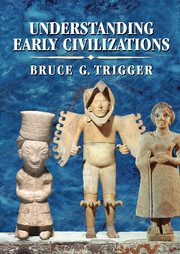Book contents
- Frontmatter
- Contents
- List of Illustrations
- Preface
- Understanding early civilizations
- Introduction
- Sociopolitical organization
- 5 Kingship
- 6 States : City and Territorial
- 7 Urbanism
- 8 Class Systems and Social Mobility
- 9 Family Organization and Gender Roles
- 10 Administration
- 11 Law
- 12 Military Organization
- 13 Sociopolitical Constants and Variables
- Economy
- Cognitive and symbolic aspects
- Discussion
- References
- Index
10 - Administration
Published online by Cambridge University Press: 05 June 2014
- Frontmatter
- Contents
- List of Illustrations
- Preface
- Understanding early civilizations
- Introduction
- Sociopolitical organization
- 5 Kingship
- 6 States : City and Territorial
- 7 Urbanism
- 8 Class Systems and Social Mobility
- 9 Family Organization and Gender Roles
- 10 Administration
- 11 Law
- 12 Military Organization
- 13 Sociopolitical Constants and Variables
- Economy
- Cognitive and symbolic aspects
- Discussion
- References
- Index
Summary
Weberian sociologists blandly define the state as a government that possesses a monopoly of the legitimate use of force within a specific territory. Marxists more cynically regard the state as a mechanism that deploys physical coercion to defend the property and privileges of the dominant social classes (Kamenka 1989: 7–11). While these definitions suggest what a state is, they are inadequate to describe, even from a purely political point of view, how a state operates. Physical force is never sufficient by itself to maintain order within society. Such order depends on most people's being prepared to accept the way things are being done. Social control is also inherent in communities, economic institutions, and the family, whose leaders exert their own forms of control through economic, social, and ideological coercion and by manipulating public opinion (Mann 1986). Within unified political entities, public order depends to a large degree on the extent to which those who control these other sectors of society are prepared to cooperate with the state and with each other.
The state can also be viewed as an administrative mechanism that extracts sufficient resources from society to maintain itself, defends the territory it controls from foreign aggression, and is responsible for maintaining the unity of its territory, if necessary by force. To do this it must uphold a social and economic order which convinces ordinary people that, despite the demands the state imposes on them, it makes their lives more prosperous and secure than they would be if the state did not exist.
- Type
- Chapter
- Information
- Understanding Early CivilizationsA Comparative Study, pp. 195 - 220Publisher: Cambridge University PressPrint publication year: 2003



